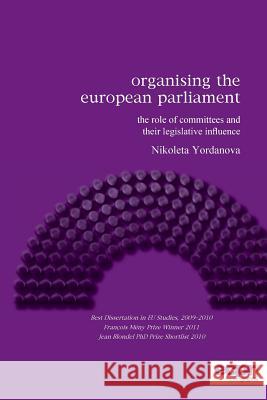Organising the European Parliament: The Role of Committees and their Legislative Influence » książka
Organising the European Parliament: The Role of Committees and their Legislative Influence
ISBN-13: 9781907301391 / Angielski / Miękka / 2013 / 200 str.
The recent empowerment of the European Parliament makes this a timely study of the impact of its internal organisation on legislative politics, interest representation and democracy within the Union. Using data on all legislators and legislative proposals in the sixth parliamentary term, the book confronts alternative theories of legislative organisation in rigorous statistical analyses supported by rich interview information. The findings indicate that the internal setup and legislative output of the parliamentary committees serve the policy goals of parties in the European Parliament, and in particular the working majority party, rather than special interests or purely informational needs, which the author explains with the formal and informal parliamentary rules. As the committees advance party politics instead of particularistic policies, she concludes that legislating within the committees is positive for democracy in the European Union and raises concerns about the loss in transparency, legitimacy and accountability that the increasingly common fast-track bicameral decision-making outside the committees entails.
Organising the European Parliament studies parliamentary committees andtheir impact on policy making, interest representation and democracy in theEuropean Union. It shows that the internal setup and legislative output of thecommittees serve the policy goals of political parties rather than particularistic interests or purely informational needs. The increase in the legitimacy, transparency and accountability of the European Union output that the committee work brings, however, is threatened by the increasingly common and informal bicameral decision making."Organising the European Parliament [original thesis] marks a substantialcontribution not only to the literature on parliaments in general and theEuropean Parliament in particular, but also to the understanding of thedemocratic defi cit in Europe and how it might be tackled."Peter Mair, Professor of Comparative Politics, European University Institute"The best book yet written on committees in the European Parliament. A mustreadfor all serious scholars and students of EU politics."Simon Hix, Professor of European and Comparative Politics, Fellow of the British Academy and Head of Department of Government London School of Economics and Political Science"The steadily increasing signifi cance and status of the European Parliament hasbeen matched by the growing interest of scholars in understanding its internalorganisational and power dynamics. In this timely study, Yordanova drawson US Congressional theories of legislative organisation to provide importantnew insights into how legislative politics operates in the European Union. Ina systematic and thorough review of a large range of evidence she shows that,while there is some scope for MEP specialisation, ultimately the EuropeanParliaments legislative process is heavily conditioned by partisan interests."David Farrell, Jean Monnet Professor of Politics and Head of School of Politics and International Relations University College Dublin•Awarded the Prize for Best Dissertation in EU Studies 2009-2010 by theEuropean Union Studies Association, Boston, US.•Awarded the François Mény Prize 2011 for the Best Comparative Study ofPolitical Institutions by the European University Institute, Florence, Italy.•Shortlisted for the Jean Blondel PhD Prize 2010 for best thesis in Politics by the European Consortium for Political Research Press.











